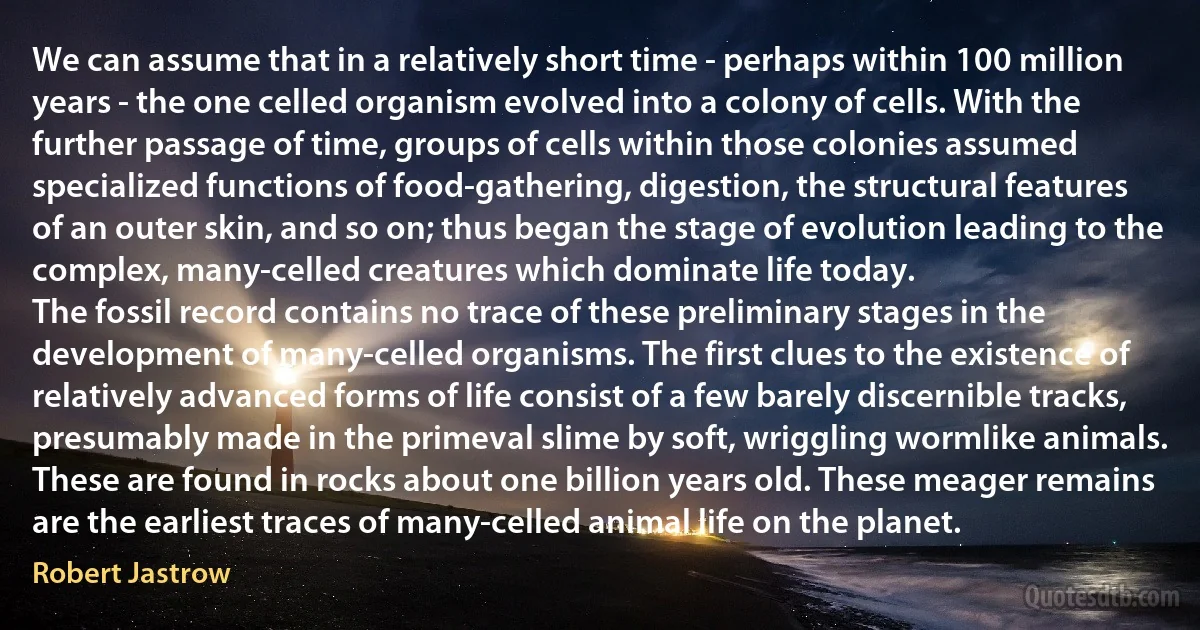
We can assume that in a relatively short time - perhaps within 100 million years - the one celled organism evolved into a colony of cells. With the further passage of time, groups of cells within those colonies assumed specialized functions of food-gathering, digestion, the structural features of an outer skin, and so on; thus began the stage of evolution leading to the complex, many-celled creatures which dominate life today. The fossil record contains no trace of these preliminary stages in the development of many-celled organisms. The first clues to the existence of relatively advanced forms of life consist of a few barely discernible tracks, presumably made in the primeval slime by soft, wriggling wormlike animals. These are found in rocks about one billion years old. These meager remains are the earliest traces of many-celled animal life on the planet.
Robert JastrowRelated topics
animal begin billion complex development digestion dominate early evolution few found fossil life organism passage perhaps short skin slime soft structural thus time remains 100 today years rocksRelated quotes
My broad position remains firmly libertarian, sceptical of official cover-ups and uncompromisingly internationalist, believing sovereignty to be an almost total illusion in the modern world, although both expecting and welcoming the continuance of strong differences in national traditions and behaviour. I distrust the deification of the enterprise culture. I think there are more limitations to the wisdom of the market than were dreamt of in Mrs Thatcher's philosophy. I believe that levels of taxation on the prosperous, having been too high for many years (including my own period at the Treasury), are now too low for the provision of decent public services. And I think the privatisation of near monopolies is about as irrelevant as (and sometimes worse than) were the Labour Party's proposals for further nationalisation in the 1970s and early 1980s.

Roy Jenkins
There are two ways of considering society. According to some, the development of human associations is not subject to providential, unchangeable laws. Rather, these associations, having originally been organized in a purely artificial manner by primeval legislators, can later be modified or remade by other legislators, in step with the progress of social science. In this system the government plays a preeminent role, because it is upon it, the custodian of the principle of authority, that the daily task of modifying and remaking society devolves.According to others, on the contrary, society is a purely natural fact. Like the earth on which it stands, society moves in accordance with general, preexisting laws. In this system, there is no such thing, strictly speaking, as social science; there is only economic science, which studies the natural organism of society and shows how this organism functions.

Gustave de Molinari
Leibnitz, the great mathematician, published his 'Protogaea' in 1680. He imagined this planet to have been originally a burning luminous mass, and that ever since its creation it has been undergoing gradual refrigeration. Nearly all the matter of the earth was at first encompassed by fire. When the outer crust had at length cooled down sufficiently to allow the vapors to be condensed, they fell and formed a universal ocean, investing the globe, and covering the loftiest mountains. Further consolidation produced rents, vacuities, and subterranean caverns, and the ocean, rushing in to fill them, was gradually lowered. The principal feature of this theory, the gradual diminution of the original heat, and of an ancient universal ocean, were adopted by Buffon and De Luc, and entered under different modifications, into a great number of succeeding systems.

Charles Lyell
In comparing civilized man with the animal world, one is as the Alpine traveller, who sees the mountains soaring into the sky and can hardly discern where the deep shadowed crags and roseate peaks end, and where the clouds of heaven begin. Surely the awe-struck voyager may be excused if, at first, he refuses to believe the geologist, who tells him that these glorious masses are, after all, the hardened mud of primeval seas, or the cooled slag of subterranean furnaces-of one substance with the dullest clay, but raised by inward forces to that place of proud and seemingly inaccessible glory. But the geologist is right; and due reflection on his teachings, instead of diminishing our reverence and our wonder, adds all the force of intellectual sublimity, to the mere aesthetic intuition of the uninstructed beholder.

Thomas Henry Huxley
Interaction is the mode of life of living organisms. Each must feed on its environment, ingesting chemicals or other organisms. This is something more than "interaction", it is activity directed towards the environment. Since the organism must be selective in what it ingests, it needs to discriminate among the entities in its environment. From very primitive forms of discrimination, the sensory mechanisms of organisms have evolved into the senses of man, interpreted by an internal cognitive apparatus, memories of past experiences, and an ability to take rational decisions. By "rational" I mean activity that achieves intended results because it is based on a reliable understanding of the nature of the environment. In interacting with each other to carry out tasks jointly, men have further developed language, leading to a shared understanding of the environment. This shared understanding is knowledge.

Brian Campbell Vickery
